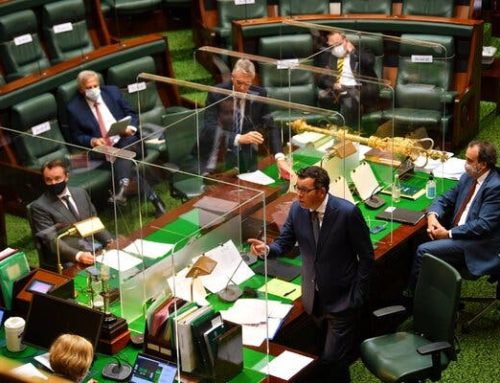Donald Horne, author of The Lucky Country
Many people are unaware that one of Australia’s most famous monikers, “The Lucky Country,” was originally meant in a pejorative sense. The misappropriated phrase was first used as the title of the classic 1964 book by journalist Donald Horne, criticising those running the country for having had no hand in its success. “Australia is a lucky country run mainly by second rate people who share its luck,” Horne writes, “It lives on other people’s ideas, and, although its ordinary people are adaptable, most of its leaders (in all fields) so lack curiosity about the events that surround them that they are often taken by surprise.”
While Horne can be quite acerbic, one of his main concerns was that Australia was failing to make use of its considerable intellectual capital. From his point of view, Australia was too comfortable being a derivative rather than innovative society – its political and legal system having been largely inherited from Britain, its material prosperity owing to a natural endowment of valuable resources, and (for us, most importantly) its technological progress dependent upon ideas and equipment imported from other countries. This history led to unorthodox thinking being discouraged in Australian culture. Neither the national government nor the private sector were willing to invest in domestic scientific talent or attract it from abroad, leaving the country unprepared to compete in a new technological age.
While much has changed since The Lucky Country was written over half a century ago, some of Horne’s observations remain particularly relevant when assessing Australia’s quantum industry today. It is true that since Horne’s time the quality of homegrown innovation has improved dramatically. The country has also become much more diverse, less provincial, and therefore more open to new ideas. Consequently, Australia’s political leaders have begun to recognise that it has a role to play in the Asia-Pacific region, not just in the West. Yet despite these developments, the national government does not seem to be as cognizant of its place as a technologically advanced nation in the 21st century and the opportunities this affords.
Australia’s quantum industry
In recent years, assessments of Australia’s quantum industry have pointed out that it has begun to lag those of other technologically advanced nations in terms of political initiative and financial investment. In 2020, the Commonwealth Scientific and Industrial Research Organisation (CSIRO) published a report about the importance of Australia’s quantum technology industry for economic growth and national security, urging the national government to take on more responsibility for funding and coordinating state, private sector, and academic initiatives across the country. Indeed, the Australian Strategic Policy Institute noted that in 2021 Australia ranked last among the nine largest economies actively investing in quantum technology even though it had ranked sixth in 2015.
By contrast, the national governments of other middle powers such as France, Japan and the Netherlands have recently announced additional billion-dollar (AUD) investments in quantum technology with the intention of maintaining their international competitiveness. While the United States and China, as economic giants, are naturally leading the way in investment and innovation in quantum, these national initiatives by middle powers demonstrate that they still have the capacity to influence the development of quantum technology and potentially capture the resulting financial and strategic benefits.
It is encouraging to see that the Australian federal government has announced the development of a National Quantum Strategy and is investing further funds into quantum technology. However, as CSIRO’s report pointed out, the national government still does not have a proper plan for developing the infrastructure and facilities necessary for a domestic quantum industry. The lingering question of whether this National Quantum Strategy will lead to greater coordination between academia and industry remains. Cross-pollination of the two sector’s expertise would not only lead to greater innovation but also the commercialisation of quantum technologies. Without this, it will be difficult for Australia’s quantum industry to blossom.
Yet despite lacking coordination at the federal level and the vast resources that other countries have at their disposal, Australia is still producing world-class quantum research. This can be attributed to Australia’s historic strengths in the field. In the 1980s and 1990s, early research in quantum optics and condensed matter physics was supported by strong government funding, giving Australia an edge that has ensured that today’s quantum industry is well-placed. Among Australia’s 22 quantum-related research institutions, eight universities are currently performing “well-above” world standard quantum physics research. This has led to numerous university spin-offs and a vibrant quantum start-up ecosystem.
Investing in quantum
Just as Horne feared, the full potential of Australia’s intellectual capital remains untapped. However, what is more concerning is that it is beginning to diminish because of two problems which he identified decades ago, and which have persisted ever since – lack of sufficient interest from the government, which has been discussed, but also from private investors. Many talented Australians with quantum expertise have been lured away by more attractive offers overseas, having found local support inadequate for their ambitions – a trend which has plagued the technology industry more broadly.
Indeed, the risk-averseness of Australia’s venture capital industry has been seen as a major impediment to allowing start-ups to flourish. One of the founding fathers of the internet, Gordon Bell, who is actively involved in Australia’s venture capital scene, notes that there is not nearly enough money being allocated towards risky ventures. Those start-ups which are lucky enough to obtain funding often face onerous terms, such as giving up disproportionately large amounts of equity in return for meagre financial support.
If these issues are not addressed, Australia risks becoming dependent on the United States in the field of quantum technology. The Australian government’s invitation to the CIA’s venture capital arm, In-Q-Tel, to invest in Australia’s start-up space (including quantum) signals a degree of complacency in allowing American capital and expertise to act as a surrogate for Australia’s. While there is nothing particularly new or alarming about high rates of American investment into the Australian economy there is no reason why the Australian government could not take the lead in supporting and investing in its own domestic start-ups.
Luck is knowing how much to leave to chance
Australia must break down not just institutional but also cultural barriers which are preventing far-sighted use of its intellectual and financial capital. Horne reasoned that Australia’s lack of interest in developing its own technology industry stemmed from Australians having historically relied on the ideas, money, and military protection of Britain and the United States. For Australia’s quantum industry to flourish, there must not only be organisational changes instituted by the national government but also a change in the mindset of the national government and investment community – they must acquire a greater appetite for risk-taking. As quantum technology could potentially have major economic and defence ramifications, it is critical that Australia pays more attention to its technology industry before the world passes it by.







Leave a Reply